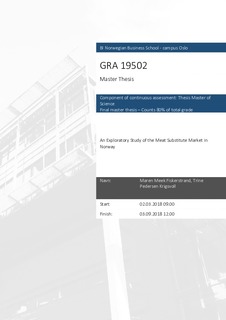| dc.description.abstract | This thesis explores the meat substitute market in Norway, more specifically in
Oslo. We have investigated Norwegian consumers’ understanding of meat
substitute products, their motivations for purchase and in which situations meat
substitute products are consumed.
We have used a qualitative, explorative approach including two studies: a prestudy
and a main study. Here, we have combined semi-structured interviews with
observations to gain as much knowledge about the participants as possible. Our
study found that there are differences between meat eaters and non-meat eaters
which should be taken into consideration when developing and marketing new
meat substitute products. We also identified a gap in the meat substitute market,
which is meat substitute products for breakfast and lunch. The meat substitute
products for dinner is much improved, but there are little or no products made
specifically for breakfast or lunch to substitute e.g. ham, spreading etc. This gap
should be explored, as it has been in our neighbor countries.
We also found that non-meat eaters and people who sometimes consume meat,
had different requirements for products, and that this is something that should be
explored further in research as well as in advertising. The more you eat meat, the
more you would want a meat substitute product to be similar to meat. This makes
factors like taste, texture and appearance more important for meat eaters than for
non-meat eaters. Both groups consider fish to be a healthy substitute for meat, in
contrast to traditional vegans and vegetarians who consider fish to be meat.
When it came to the different types of motivations, we found that the most
important factor was what results they were hoping for when changing their diet.
Respondents focusing on the positives of eating less meat, seemed to eat less meat
substitute products than respondents focusing on avoiding negative consequences
from eating meat. In the same way focusing on skin, weight and health also
seemed to result in a higher motivation to eat meat substitute products than larger
goals, like focusing on the environment. | nb_NO |
